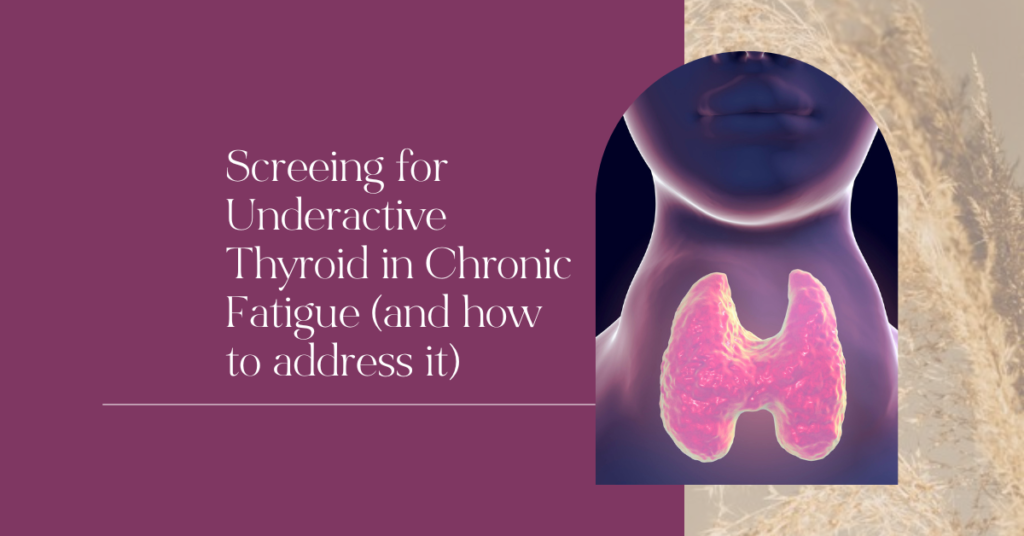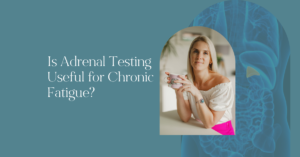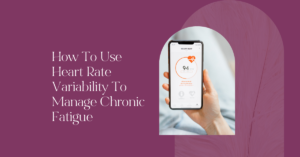Underactive thyroid, more specifically, autoimmune thyroiditis, can be an underlying cause of chronic fatigue. Proper screening can help to identify that there could be a problem before thyroid function becomes impacted. This blog will help you:
- Understand the roles of the thyroid gland and it’s hormones.
- Learn how you can identify risk for underactive thyroid (hypothyroid) in the early stages of dis-ease.
- Learn how autoimmune thyroid dysfunction, which is the cause of 90% of underactive thyroid states, impacts the whole body, not just the thyroid.
- Learn what you can do to positively impact thyroid autoimmunity.
What is the thyroid gland?
The thyroid gland is a small, butterfly-shaped endocrine gland located in the front of the neck, just below the Adam’s apple (also known as the laryngeal prominence). It plays a crucial role in regulating various bodily functions by producing hormones that help control metabolism, growth, and development.
The two primary hormones produced by the thyroid gland are thyroxine (T4) and triiodothyronine (T3). These hormones are released into the bloodstream and have a widespread impact on nearly every cell and tissue in the body. They influence the rate at which cells use energy (metabolism), affecting processes such as heart rate, body temperature, digestion, and even mood.
Understanding Thyroid Hormones and Imbalances
The production of T4 and T3 is regulated by the hypothalamus and pituitary gland through a feedback loop. The hypothalamus produces thyrotropin-releasing hormone (TRH), which signals the pituitary gland to release thyroid-stimulating hormone (TSH). TSH, in turn, stimulates the thyroid gland to produce and release T4 and T3. When the levels of T4 and T3 in the bloodstream reach appropriate levels, they send signals back to the hypothalamus and pituitary to regulate their production.
Imbalances in thyroid hormone production can lead to various health issues. When the thyroid gland is overactive and produces too much hormone (hyperthyroidism), it can result in symptoms like weight loss, rapid heartbeat, nervousness, and irritability. On the other hand, when the thyroid gland is underactive and produces too little hormone (hypothyroidism), it can cause symptoms such as fatigue, weight gain, depression, and sensitivity to cold.
Due to the relationship between the thyroid and symptoms of fatigue, it is important that your thyroid is properly screened when you present with chief complaints of fatigue.
What does proper screening involve?
The traditional medical model measures Thyroid Stimulating Hormone (TSH) to assess thyroid dysfunction. Elevated levels of TSH can indicate a hypothyroid (underactive) state and low levels of TSH can indicate a hyperthyroid (overactive) state.
One can also assess thyroid hormones, T4 and T3.
If TSH is found to be high – indicating underactive thyroid – thyroid hormones may be prescribed to normalise TSH.
However, 90% of adult hypothyroidism is the result of an autoimmune condition known as Hashimoto’s Thyroiditis. This is diagnosed through the presence of thyroid antibodies anti-thyroid peroxidase (anti-TPO) antibodies and anti-thyroglobulin antibodies.
Some individuals can have symptoms of underactive thyroid, even when TSH is normal, but they may test positive for thyroid antibodies.
Therefore, proper screening involves testing for TSH and thyroid antibodies.
When to consider testing?
The main symptoms of underactive thyroid include:
- Fatigue
- Dry Hair
- Puffy Face
- Enlarged Thyroid
- Slow Heartbeat
- Arthritis
- Cold Intolerance
- Loss of Eyebrow Hair
- Depression
- Dry Skin
- Forgetfulness
- Menstrual Disorders
- Infertility
- Muscle Aches
- Weight Gain
- Constipation
- Brittle Nails
But, 90% of people who test positive for thyroid antibodies may not show any symptoms of the symptoms may not be on this list because an autoimmune thyroid condition is an immune system problem which can impact the whole body, not just the thyroid.
Therefore, if you are someone experiencing a Chronic Fatigue health condition, you want to make sure you test your TSH and thyroid antibodies. You can have this conversation with your doctor or use a private testing company like Medichecks.
Is Hormone Replacement Therapy The Answer?
If your TSH is elevated, then you need hormone replacement therapy to help your thyroid hormone levels normalise. Many people can experience a great improvement in their symptoms when taking hormone replacement therapy but over time, symptoms can return. This is known as the honeymoon period.
The reason for the return in symptoms is that there may be ongoing consequences of the systemic autoimmunity which still need to be addressed.
If you find that you need to regularly increase your dosage of thyroid hormones to stabilise your TSH, this can be a clue that there is more work to be done on your immune system and get the autoimmunity under control.
Understanding (thyroid) Autoimmunity
There are 3 stages of autoimmunity:
- Silent Autoimmunity: when there are antibodies but no symptoms
- Reactive Autoimmunity: when there are antibodies and symptoms
- Destructive Autoimmunity: when there are antibodies and tissue destruction
If you are someone with a normal TSH but you experience symptoms associated with underactive thyroid, you may be in stage 2. If you need hormone replacement therapy, your thyroid gland is no longer able to produce adequate hormones and therefore there is likely tissue destruction and you are in stage 3.
If you test positive for thyroid antibodies on a general screen, but you have no symptoms, the goal is to keep you at stage 1, and you can do that by considering the same diet, lifestyle and environmental factors that those in stage 2 and 3 will want to consider.
Remember, if you have thyroid autoimmunity, stabilising your TSH with hormone replacement therapy is essential but not enough. You want to support the immune dysregulation and the body as a whole.
Understanding The Systemic Dysregulation of Thyroid Autoimmunity
Thyroid hormones impact all body systems and therefore, there are many different webs of thyroid dysfunction and each one may take time to unpick. Chronic illness is often complex and it is a slow process to take all the steps required to rebalance physiology.
The thyroid gland impacts:
The Immune System
Although the immune system may the source of the problem in an autoimmune condition, there is a vicious cycle whereby thyroid dysfunction creates further immune dysregulation through a variety of mechanisms including:
- Increase intestinal, lung and blood brain barrier permeability due to increased inflammatory load and poor regeneration potential
- T cell dysregulation
- Dendritic cell dysregulation
- Macrophage dysregulation
- Decreased antioxidant production and oxidation stress
- Systemic inflammation, neuroinflammation
The Brain
Two of the most common symptoms of underactive thyroid are fatigue and depression which could be due to brain derived mechanisms. TPO antibodies can bind to immune cells in the brain and generate neuroinflammation. It is also common for people with thyroid antibodies to also have antibodies to neurological tissue. Overall low antioxidant status and increased inflammation due to immune dysregulation can impact brain health and neurotransmitter function. Screening for neurological antibodies should be encouraged.
The Gut
Hashimotos has been associated with decreased diversity of commensal bacteria species in the gut. This may negatively impact oral and immune tolerance and overall immune regulation. There may be increased risk of gallstones or sludge due to poor gallbladder contraction and therefore decreased bile salt release, vitamin A and D deficiency. Reduced gut motility may predispose an individual to additional challenges such as Small Intestinal Bacterial Overgrowth (SIBO).
Blood Sugar Regulation
If someone is more prone to low blood sugar (hypoglycemia) this results in an increased demand on the adrenal glands to produce catecholamines and cortisol to release stored glucose and also insulin surges to get sugar into the cells. Insulin surges may trigger inflammatory responses and exacerbate autoimmunity.
If someone is more prone to high blood sugar (hyperglycemia) they may have high insulin levels, also increasing inflammation and autoimmunity. Therefore blood sugar must be stabilised to manage the autoimmunity. You can learn more about this here.
There may be additional complications that impact the clinical picture such as pancreatic autoimmunity or adrenal autoimmunity.
The Liver
The liver is where the body converts T4 to T3. Low levels of thyroid hormones impair T4 to T3 conversion, further reducing thyroid hormones – which is why hormone replace therapy is essential to managing the autoimmunity. Additionally, systemic inflammation can upregulate cells in the liver known as kupffer cells, driving loss of oral tolerance and food sensitivities. Reactions to food proteins can cross-react to human tissue and exacerbate autoimmunity. Poor clearance of hormones, metabolites and toxic compounds can increase the chemical burden on the body, increase oxidative stress and inflammation, all of which negatively impacts the clinical picture.
Female Hormones
Poor thyroid function can impact female hormones and cause infertility, poor hormone clearance and oestrogen dominance which may show as infertility, miscarriages or abnormal menstrual cycles.
How To Support The Thyroid Gland?
Given all of this complexity, where do we begin to support the thyroid gland?
Proper care must be overseen by a medical professional who can prescribe hormone replacement therapy in the form of T4, T3 or a combination of T4 and T3. Regular monitoring is required to ensure that TSH remains stable and the optimal dosage is recommended.
It is good to be on the lookout for symptoms of hyperactive thyroid, which may suggest over-medication. Symptoms include:
- Heart palpitations
- Increased heart rate
- Sweating
- Flushing
- Intolerance to heat
- Inward trembling
- Muscle loss
- Insomnia
- Anxiety
- Increased bowel motility
Once the thyroid is stabilised with medication it may be time to work more aggressively on diet, lifestyle and environmental factors.
Identifying Dietary Triggers
There are many possible dietary triggers for for thyroid autoimmunity, these include:
- Gluten
- Sodium
- Iodine
- Lectins
- Lack of Dietary Diversity
- Glyphosate
- Pro-inflammatory diet
- Grains
- Casein
- Albumin
- Dietary Protein Cross Reactivity – foods that cross react with thyroid tissue.
Many people who test positive for thyroid antibodies will also react to gluten, whether that is celiac disease (positive tissue transglutaminase 2) or gluten sensitivity. Someone who tests positive for tissue transglutaminase 2 may also react to gluten cross reactive food, which include:
- Dairy
- Corn
- Millet
- Oats
- Rice
- Amaranth
- Buckwheat
- Hemp
- Potato
- Sesame
- Sorghum
- Tapioca
- Teff
- Quinoa
There are also foods that cross-react with T4 and T3 thyroid hormones which, if test positive on food sensitivity testing, should also be avoided. These include:
- Almond
- Almond roasted
- Amaranth
- Avocado
- Barley
- Black bean cooked
- Brazil nut raw & roasted
- Brussels sprouts cooked
- Buckwheat
- Casein (α & β)
- Cashew
- Cashew roasted
- Cashew vicilin
- Chocolate
- Clam cooked
- Coffee
- Corn
- Cow’s milk
- Egg Yolk cooked
- Gelatin
- Hazelnut raw and roasted
- Hemp
- Kamut
- Latex hevein
- Lemon and lime
- Macadamia nut raw and roasted
- Millet
- Mustard seed
- Oats
- Orange Juice pasteurised or concentrate
- Peanut butter
- Peanut roasted
- Pistachio raw and roasted
- Potato
- Potato white baked
- Quinoa
- Radish
- Rice
- Rye
- Salmon raw
- Scallops cooked
- Seaweed
- Sesame
- Shrimp cooked
- Sorghum
- Soy Bean agglutinin
- Soy sauce gluten-free
- Spelt
- Squid (calamari) cooked
- Sunflower seeds roasted
- Tapioca
- Tofu
- Tilapia cooked
- Tuna cooked
- Tuna raw
- Yeast
- Zucchini cooked
A good starting point for many would be a paleo diet or autoimmune paleo diet with the option to remove further cross reactive foods as needed. As the diet becomes more restrictive, it is important to eat as diverse as possible.
Identifying Lifestyle Triggers
The following are the main triggers for autoimmunity generally and should all be addressed:
- Insomnia – you can read more about how to address sleep here.
- Sedentary
- Overtraining
- Smoking
- Alcohol
- Drug
- Lack of rest
- Unhealthy relationships
- Stress
Pathogens
Certain pathogens may increase thyroid autoimmunity through molecular mimicry. This is when there is a similar protein sequence on the pathogen to that of human tissue. When an antibody is created against the pathogen it may also attack human tissue. By removing the pathogen, you remove the antibodies and this can produce more favourable clinical outcomes. Those backed by research include:
- H.pylori
- Toxoplasma Gondii
- Yersinia Enterocolitica
- Candida
- Hepatitis C
- EBV
- Herpes Virus 6
- Parvovirus B-19
- Borrelia Burgdorferi
Chemicals
Chemicals can increase oxidative stress and / or when chemical load is excessive, chemical can bind to proteins in the body (e.g. albumin) and antibodies can form against the chemical which also react with human tissue. BPA is the most common one for thyroid autoimmunity, but there are other factors to consider too:
- BPA
- Pesticides
- Air Pollution
- Fire Retardants
- Benzene
- PCBS
- PBDE
- Perchlorate
- Mercury
Supplements
Supplements requirements may vary on a case by case basis depending on the nature of the system imbalances. The following may be useful considerations:
- Glutathione for managing oxidative stress
- Selenium
- Vitamin A & D for immune regulation










